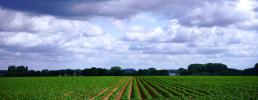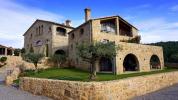H2020 SURE-Farm project: Towards sustainable and resilient EU agricultural systems
- Type Project
- Status Filled
- Execution 2017 -2021
- Assigned Budget 4.875.616,25 €
- Scope Europeo
- Main source of financing Horizon 2020
- Project website Proyecto SURE-Farm
European agricultural systems are facing an increasingly complex and volatile environment, testing their resilience and sustainability. In this context, the EU-funded SURE-Farm project is developing a comprehensive framework that seeks to strengthen the agricultural sector. Through a resilience-focused approach, the project seeks to address the multiple economic, social, and ecological challenges facing the agricultural sector, offering innovative solutions and a path to a more resilient and sustainable future. By prioritizing stakeholder collaboration, SURE-Farm goes beyond assessments, equipping farmers with new risk management tools and facilitating their integration into the sector.
A novel resilience framework for agricultural systems has been developed in collaboration with the entire SURE-Farm consortium. This framework addresses the complex and growing challenges facing agricultural systems and focuses on three resilience capacities (robustness, adaptability, and transformability) as key determinants of resilience.
The framework has already been widely disseminated among the scientific public and stakeholders. Regarding possible future scenarios for EU agricultural systems, five scenarios based on socioeconomic trajectories have been developed and presented to the scientific public. Multiple primary data collection methods have been implemented in the case study regions (CS), including structured and piloted farmer surveys on risk perception, risk management, and resilience capacity, biographical narratives with farmers about their adaptive behavior, and in-depth interviews with farmers to understand their learning and self-organization capacity.
In addition to primary data, secondary data on the adoption of the Risk Management Toolkit, as well as weather and yield data for insurance policymaking, are being collected. Farm demographic trends and challenges have been reviewed in 11 SCs, and interviews with farmers and key informants have been conducted in 11 SCs. Focus groups to collect data for the Farm Demographic Assessment Tool have also been completed in 5 SCs. The ResAT tool is being applied to CAP and local legislation in 11 SCs, with interesting findings already presented during a multi-sector workshop in the Netherlands.
An Integrated Assessment (IA) toolkit has been developed for assessing the resilience and provision of private and public goods in agricultural systems, including various models. Participatory workshops on assessing current sustainability and resilience are being organized in 11 SCs. An approach has been conceptualized to integrate the findings from different work packages in each SC region into a holistic analysis. This approach will be based on the five generic resilience principles and address both resilience-enhancing and resilience-limiting attributes. The retrospective analysis in 11 SCs will be used to identify implementation roadmaps (Who? What? When?). The SURE-Farm project employs multiple co-creation processes throughout its various stages, including digital co-creation through a dedicated area on the SURE-Farm website, local co-creation, and a core co-creation group composed of public and private actors who provide feedback on approaches and outcomes. An international scientific committee also evaluates key outcomes.
The key results at this stage of the project are:
- The creation of a framework that allows for a detailed diagnosis of the resilience of an agricultural system, for example, simultaneously identifying an environment that limits resilience to social and economic challenges and an environment that enhances it to environmental challenges, or vice versa.
- Five scenarios have been developed in the context of resilience.
- We found that most agricultural systems perceive generational renewal as a future challenge for the resilience of agricultural systems.
We conclude that current policies and strategies contribute primarily to robustness and adaptability, but less to transformability. We find that modeling tools are available to assess robustness and adaptability, but less so for transformability.
The resilience and sustainability of European agricultural systems can no longer be taken for granted, as the economic, social, and ecological environment of these sectors becomes more complex and volatile. Using resilience thinking, SURE-Farm develops a comprehensive framework that facilitates resilience, develops and applies resilience assessment tools, and collaborates on the creation of roadmaps for their implementation.
Its objectives are: to measure the determinants of resilience; to improve farmers' decision-making and risk management; to assess demographic changes on farms and their relationship to labor markets; to evaluate the current policy framework and develop policy options that foster resilience; to conduct integrated long-term projections of the resilience of agricultural systems; and to identify pathways to implement a resilience-promoting environment.
These objectives are achieved through the development of stressor scenarios, the analysis of farmers' risk perceptions and behaviors, the development of improved risk management tools tailored to the specific challenges of diverse EU farming systems, the creation of a farm demographic assessment tool based on agent-based models that measures the dimensions and dynamics of farm structures, the creation of a novel policy resilience assessment tool to assess the strengths and weaknesses of the CAP and other existing policies, as well as their national transpositions, and the construction of an integrated impact assessment model to make projections towards the sustainable future provision of private and public goods by farming systems across the EU. In collaboration with stakeholders, the results of these assessments are synthesized to promote an enabling environment and co-design implementation roadmaps.
SURE-Farm thus provides a comprehensive analysis of the complex challenges facing the European agricultural sector and an assessment of relevant policies, based on long-term projections and integrated models. By designing new risk management tools for farmers, measures to facilitate entry into the sector, and validated roadmaps, the sector's resilience is strengthened.
The resilience and sustainability of European agricultural systems can no longer be taken for granted as the economic, social, and ecological environment of these sectors becomes more complex and volatile. Using resilience thinking, SURE-Farm develops a comprehensive resilience-enabling framework, develops and implements resilience assessment tools, and co-creates implementation roadmaps.
Its objectives are: to measure the determinants of resilience; improve farmers' decision-making and risk management; assess agricultural demographic changes and their linkages to labor markets; evaluate the current policy framework and develop policy options to enhance resilience; make integrated long-term projections of the resilience of agricultural systems; and identify pathways to implement a resilience-enhancing environment. These objectives are achieved by developing stressor scenarios, analyzing farmers' risk perceptions and behaviors, developing enhanced risk management tools tailored to specific challenges across the range of EU farming systems, creating a farm demographics assessment tool informed by agent-based models that measure the dimensions and dynamics of farm structures, creating a new policy resilience assessment tool to assess the strengths and weaknesses of the existing CAP and other policies and their national transpositions, and building an integrated impact assessment model to make projections towards the sustainable future delivery of public and private goods by farming systems across the EU.
In co-creation with stakeholders, the results of these assessments are synthesized to support an enabling environment and co-design implementation roadmaps. In this way, SURE-Farm provides a comprehensive analysis of the complex challenges facing the European agricultural sector and an assessment of relevant policies, based on long-term projections and integrated models. By designing new risk management tools for farmers, measures to facilitate entry into the sector, and validated roadmaps, the sector's resilience is supported.
The comprehensive resilience framework and three assessment tools (policy, farm demographics, and the Integrated Resilience Assessment Tool) will provide an opportunity for a more proactive and holistic approach to ensuring the sustainability and resilience of EU agricultural systems. This will accelerate risk assessment and the development of strategies to enhance resilience. Since stakeholders and potential users will be involved at all stages of design and in a first round of implementation, the framework and tools are highly likely to be adopted by the user community. Furthermore, SURE-Farm identifies factors influencing farmers' risk perceptions and behaviors, as well as their entry and exit decisions.
Finally, SURE-Farm synthesizes the knowledge generated into a viable design for an enabling environment for a sustainable and resilient European agricultural sector. The knowledge generated by the SURE-Farm project will also facilitate innovation processes in a broader context. The increased understanding of stressors and determinants of resilience that will emerge from SURE-Farm will stimulate further innovation across farms, agricultural systems, and value chains.
So far, the societal implications of SURE-Farm stem from increased awareness among public and private stakeholders and the scientific community about the importance of enhancing three resilience capacities (i.e., robustness, adaptability, and transformability) in the context of agricultural systems, compared to "robustness alone"; multi-stakeholder discussions about scenarios in the context of resilience; increased awareness and business opportunity for index insurance in Europe; fueled debates about generational renewal in agricultural systems; awareness among local and EU policymakers about the current narrow policy focus on robustness; and a broader multi-stakeholder understanding of the links between sustainability and resilience in agricultural systems.
- WAGENINGEN UNIVERSITY (WU)
- Project website (CORDIS)
- Cordis web results
- News: Critical analysis of how current policies limit/enable resilient European…
- News: Policy options to improve the demographic resilience of farms
- News: Why the CAP should broaden its focus on resilience
- News: A resilience-oriented CAP must address the robustness, adaptability, and …







